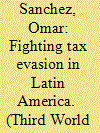| Srl | Item |
| 1 |
ID:
106667


|
|
|
|
|
| Publication |
2011.
|
| Summary/Abstract |
In the 1990s both Chile and Argentina embarked on efforts to tackle tax evasion. The strategies they pursued differed substantively: Argentina followed a coercive approach that created an elite audit team endowed with special legal powers, while Chile undertook a less spectacular service-oriented approach that improved the fiscal pact between state and society and enacted tax administration reform. Chile succeeded in permanently lowering tax evasion levels, while Argentina's success was short-lived and evasion levels soon returned to previous heights. Besides important differences in the institutional strength of these countries, the contrasting outcomes can be attributed in no small measure to the different strategies adopted. Their experience can provide some useful lessons in the elusive battle against tax evasion in Latin America.
|
|
|
|
|
|
|
|
|
|
|
|
|
|
|
|
| 2 |
ID:
021760


|
|
|
|
|
| Publication |
April 2002.
|
| Description |
143-160
|
| Summary/Abstract |
The end of the Cold War, the advent of globalisation, and new horizons in trade theory, all seem to point out to the need for a new American economic strategy. Indeed, for many they beg for the implementation of economism as the new US foreign policy doctrine. The managed trade policy (1993-1996) of forcibly opening foreign markets for the benefit of corporate America showed much of what is wrong with a trade-first agenda in foreign affairs: it accomplished nothing in terms of economic gain while creating dangerous spillovers into other foreign policy areas--such as political and security bilateral relationships--thus endangering the broader goals of US foreign policy. A foreign policy that puts trade at the top of the agenda is unwarranted, probably unsustainable, and ultimately counterproductive. Moreover, it is hardly the most important tool by which the economic wellbeing of most Americans can be enhanced. The return of low productivity figures and a slowing American economy may well rekindle calls for a policy of managed trade. Such calls must be rejected and the lessons of the recent past must be heeded.
|
|
|
|
|
|
|
|
|
|
|
|
|
|
|
|
| 3 |
ID:
056434


|
|
|
| 4 |
ID:
081229


|
|
|
|
|
| Publication |
2008.
|
| Summary/Abstract |
This article surveys the evolution of party systems in South America in terms of their level of institutionalisation. In recent times political competition in much of South America has become less structured by political parties proper and has moved in the direction of candidate-centred movements and electoral vehicles led by political entrepreneurs. Most countries in South America (Brazil, Chile and Uruguay are exceptions) have experienced party system de-institutionalisation during the 1990s and 2000s, as voters have systematically punished traditional parties, often rendering them marginal or forcing their disappearance. The scale of decomposition varies across cases but it has affected countries with historically well institutionalised party systems and those with inchoate party systems (Ecuador, Peru, Bolivia) alike.
|
|
|
|
|
|
|
|
|
|
|
|
|
|
|
|